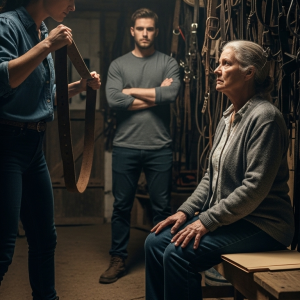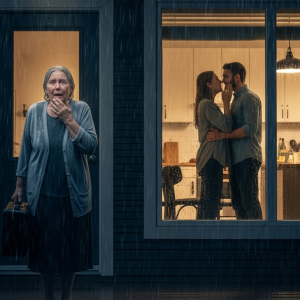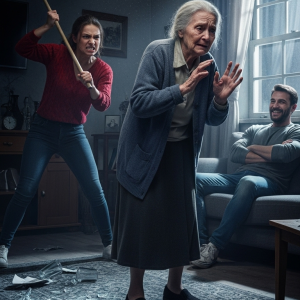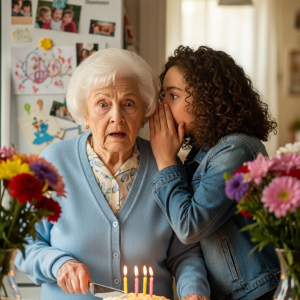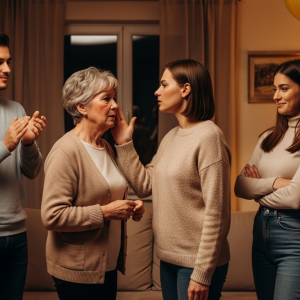At my sister’s funeral, my daughter Vanessa called me a parasite. She stood before a hundred mourners and shouted that I had no right to the vineyard, the cattle, or the money my sister, Lydia, had left to me. Eight years ago, Vanessa cut me out of her life because I refused to fund her husband’s failing business. Now, she was trying to erase me all over again.
I didn’t say a word. Not when her voice bounced off the church ceiling, not when people gasped, and not when I saw Samuel, Lydia’s loyal vineyard manager, lower his head in disbelief. I just stood there. My sister’s casket lay at the altar, surrounded by lilies and a photograph of her laughing in her garden hat. This was the woman who had left me everything.
My daughter had not spoken to me in eight years, not since I said no to a $30,000 loan for a scheme that was doomed from the start. She told me I had failed her as a mother and then she disappeared. Now, in front of reporters like the young woman, Clara, with her discreet camera, Vanessa was performing a public execution.
“This woman is not entitled to anything,” she declared, her voice ringing with practiced indignation. “She never helped Aunt Lydia. She doesn’t know the first thing about wine or cattle.”
Her words came like fists, but I didn’t flinch. Beneath the shame, I felt something hard rising inside me, a kind of armor that had been growing for years, ever since her father worked to turn her against me. When her outburst ended, the room fell into a heavy silence. Samuel stepped beside me and whispered, “Let’s sit,” but I shook my head.
Let her finish, I thought. Let her bleed out every last drop of venom. Because the moment she stopped screaming, the silence that followed would belong to me.
When the service ended, Vanessa left with her lawyer, not even glancing at the casket. I stayed behind and straightened the photograph of Lydia, whispering, “I heard you. I know what you wanted, and I won’t let her touch it.”
That evening, I sat at the kitchen table in the old cottage where Lydia and I used to eat toast as children. Now, it was covered in legal folders. Maxwell Thornton, Lydia’s attorney, arrived at seven. He was calm, almost cold, as he began the formal reading of the will. He saved the final lines for last.
“All land, assets, livestock, personal property, and cash holdings are hereby transferred in full to my sister, Harriet Monroe. I entrust her to preserve this land, as I know she carries its roots in her bones.”
My breath caught. Maxwell handed me a sealed envelope in Lydia’s handwriting. “We have much to review,” he said, “but know this: your sister made everything legally airtight. She anticipated resistance.”
I gave a dry, hollow laugh. “I already felt the first wave this morning.”
“That was not the last,” he said before leaving me alone with the papers. It didn’t feel like victory, not yet. But the shaking in my hands had stopped, and that meant something.
The next morning, Samuel brought coffee and croissants, and we sat on the back porch, watching the fog roll off Lydia’s land—my land. “She meant every word in that will, Harriet,” he said. “You should expect trouble.”
He was right. That evening, a courier delivered a packet of legal documents. A demand for immediate reconsideration of the will. A petition to delay the asset transfer. A motion to freeze the estate. All of it was aggressive. All of it was Vanessa. I called Maxwell.
“She’s trying to freeze everything,” I told him.
He didn’t hesitate. “I’ll file the response before midnight. She has no standing. She wasn’t in the original will. This is just noise.”
Still, it lit a fire in me. The next day, Vanessa arrived in person. I saw her through the kitchen window, standing on the front steps in a wine-colored blazer, her expression tight. I opened the door and said nothing. She stepped inside, looking around with mock disappointment. “Still the same curtains. Still smells like wet books and regret.”
She turned to me. “You think this is over? You think a letter from a dead woman erases everything I’ve done for this family?”
“Eight years, Vanessa,” I said, my voice steady. “You’ve been gone for eight years. You never called.”
She smiled, a slow, bitter curve of her lips. “So now you’re going to fix that. You’re going to sign over half the land and the cattle. It’s fair. All you have to do is sign.” She pulled pre-filled papers from her purse, convenient and ready.
I looked at the papers, then at her. “No.”
Her jaw locked. “I gave you a chance to do this the easy way.”
“You gave me nothing,” I said, stepping forward. “You walked away. You erased me. And now you stand in my sister’s house asking for what she left behind.” I watched her face shift, not to hurt, but to calculation. She softened her tone.
“Mom, let’s not fight. I can help you run this place.”
I took the papers from her hand, walked to the fireplace, and dropped them into the flames. She stared as they caught, then turned and walked out the door. No threats, no yelling. But that woman wasn’t my daughter anymore. She was a storm coming, and I was done seeking shelter.
Two days later, my old friend Eleanora Price, a retired judge, showed up with a bag of peaches and a frown. She pulled out her phone and showed me a blog post. The headline read: Local Retiree Inherits Vineyard, Freezes Out Real Heir. It was slick, full of half-truths, painting me as a greedy manipulator who had taken advantage of my dying sister.
“She wants a war,” I said.
“And she wants to win it in the court of public opinion,” Eleanora replied.
Later, I showed the article to Samuel. He read it, then handed the phone back. “She’s going for your throat,” he said.
“Let her,” I replied. I could see her plan now. She didn’t want the land; she wanted to liquidate it. She would chop Lydia’s life into parcels and sell it to the highest bidder, squeezing every last drop out of the soil until it broke.
The next morning, Vanessa returned, but this time she was performing for an audience. I found her on the porch, talking to one of the young ranch hands. “I’m sure you’re all wondering how long you’ll have jobs once my mother cashes out,” she said, her voice laced with false concern. She spotted me and her smile widened.
I blocked the doorway. “You’ve said enough.”
“The community deserves the truth,” she shot back. She dropped the next blow. “I’ve met with investors. Two serious offers already. We can both walk away with what we want. I take the rest of the land. It’s a win-win.”
My voice was steady. “You think money is the goal? It never was.”
“Then what is this?” she scoffed. “Pride? Spite?”
“No,” I said. “Legacy.”
That afternoon, Maxwell called. Her legal team had filed documents questioning my mental fitness, claiming I was too old, too detached, and too erratic to be trusted with the estate. Vanessa wasn’t trying to win in court. She was trying to drown me in papers and headlines. She thought I’d fold. She didn’t know me at all.
I met Eleanora at the café across from the courthouse. I laid a thin folder on the table. It felt like granite. She opened it. Inside were photos, emails, and a transcript of a phone call. Samuel had gathered it all with quiet precision.
Eleanora scanned the documents. “This is enough to ruin her in court,” she said, tapping an email. Vanessa had been working with a commercial developer to parcel the vineyard into luxury estates. The emails revealed her plan to dissolve Lydia’s foundation, fire the farmhands, and bulldoze the historic barn. It was premeditated.
“You said you didn’t want to fight her through the courts,” Eleanora reminded me.
“I don’t,” I said. “I’ll use the court of truth.”
I met with Clara Whitmore, the journalist from the funeral. She had been waiting for the right moment to use her footage. I handed her the folder. By sunset, she had a report: Vanessa yelling at the funeral, followed by screenshots of her emails and development plans. It was clean, harsh, and honest. I asked her to hold it for one more day.
That night, I opened Lydia’s safe. Inside was a digital recorder. I played the most recent file. Lydia’s voice filled the room, slow and careful, speaking of Vanessa’s manipulation, of her disappointment when Vanessa pressured her to change the will, and of the three years of silence that followed. She ended with a sentence that pierced my chest: “I’m leaving it all to you, Harriet, not because you want it, but because you won’t sell it.” I made three copies.
The town hall was already reserved. Lydia had booked it for the annual Vineyard Appreciation Night. Vanessa thought it was canceled, but I kept the reservation. I arrived early, wearing dark jeans and Lydia’s vineyard hat. The room filled with workers, neighbors, and even the mayor.
Vanessa walked in late, her heels loud against the floor. She took a seat in the front and smirked, thinking this was a sympathy play. She didn’t know the screen behind her was about to display her own emails.
The lights dimmed. Clara introduced the report, and the video began. You could hear a pin drop. When it ended, the room sat in stunned silence. Then Samuel stood and spoke of Lydia’s integrity. Then Eleanora. Then a field worker of twenty-one years.
Vanessa stood, red-faced, trying to shout over the noise, but no one was listening. I walked to the microphone, looked out at the room, and then I looked at her.
“You came here for money,” I said, my voice clear and calm. “I came back for memory.”
She opened her mouth, but there was nothing left to say. The meeting ended with a symbolic vote of support for me as the sole steward of Lydia’s estate. Every hand went up. Vanessa walked out alone.
The consequences began before the chairs were even folded. Clara’s report was all over social media. By noon the next day, the local wine co-op had pulled Vanessa’s name from their board. One of her two investors sent a formal withdrawal to my attorney. For the first time, the pressure had shifted.
Eleanora came by with more. A copy of a contract Vanessa had drafted to sell three parcels of land to a developer, contingent on her winning control of the will. The deal had fallen apart after the town hall, but the document remained. It was proof of her intent.
A formal inquiry was opened by the county, and soon after, the District Attorney’s office set a hearing to determine if charges could be filed for fraud. Vanessa’s car disappeared from her rental. She hadn’t run; she had gone into hiding, planning her next move. But the window for that had closed.
A week later, Vanessa’s car was back. She was sitting on the porch swing, her eyes hard. I stood at the bottom of the steps. She stared at me, calculating, but the math was failing her.
“You humiliated me,” she said. I didn’t respond. “You made me look like a monster.” Still, I said nothing. “You think this is over?”
I held her gaze, and she blinked first. The crack in her armor finally showed. She had tried everything—pity, intimidation, manipulation, public shaming—and none of it had worked. She stepped off the porch and walked past me. As she reached her car, she turned. “You’ve ruined everything.” Then she drove away.
Inside, I sat at Lydia’s desk and wrote a letter to the foundation board, confirming my intention to honor Lydia’s legacy in full. The land, unlike people, never lies. It simply waits to be protected.
The morning after Vanessa left, the ranch felt unusually still, not silent, but settled. The weight in my chest was gone. I spent the day walking the property, touching base with the land just as Lydia used to. Life continues, no matter how dramatic the day before.
I called Eleanora and told her my plan. I wanted to restructure the estate. The house and land would remain mine, but I was creating a community trust in Lydia’s name—an endowment to offer grants, mentorship, and legal support for women over 50 restarting their lives after loss or betrayal.
I added a clause. Vanessa would receive nothing. Not out of anger, but because I was done negotiating my worth.
Next, I held a staff meeting and announced a new initiative: weekend training programs on sustainable agriculture for women looking to rebuild careers. The seed had been planted.
Summer rolled in, quiet and warm. The trust was no longer a legal structure; it had become something living. Every week, women arrived with different stories and different wounds. They worked the land not just to harvest grapes, but to reclaim their sense of value.
I signed the final deed, officially transferring a new parcel of land to the Lydia Monroe Foundation for Women Reclaiming Their Lives. I had no interest in Vanessa’s apology or reconciliation. I had made peace with a different kind of silence—one I had chosen, born from clarity and purpose.
One Sunday, a volunteer’s eight-year-old daughter, Nova, asked if she could plant her own vine. We walked to a corner of the vineyard, and she knelt, pressing her hands into the dirt. That night, I wrote in my journal: Today, a little girl named Nova planted her future beside mine, and it was enough.
I never saw Vanessa again. I don’t know if she ever healed. But I stopped needing answers. This life I rebuilt was not an act of revenge. It was an act of refusal. I refused to carry her hatred, inherit her silence, or let her define my last chapter. I was writing my own.
